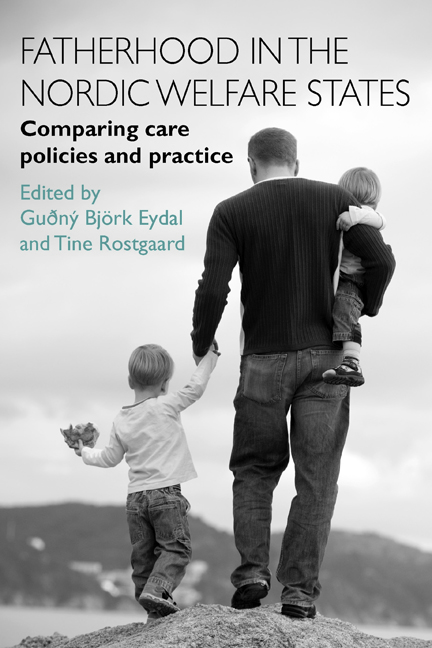Book contents
- Frontmatter
- Contents
- List of tables and figures
- Notes on contributors
- Acknowledgements
- one Introduction
- Theme 1 Fathers, families and family policies
- Theme 2 Fathers in everyday life – culture, work and care
- Theme 3 Constructing fatherhood in different family settings
- Theme 4 Caring fathers and paid parental leave policies
- Theme 5 International reflections on findings
- Conclusions
- Index
seven - Negotiating leave in the workplace: leave practices and masculinity constructions among Danish fathers
Published online by Cambridge University Press: 04 March 2022
- Frontmatter
- Contents
- List of tables and figures
- Notes on contributors
- Acknowledgements
- one Introduction
- Theme 1 Fathers, families and family policies
- Theme 2 Fathers in everyday life – culture, work and care
- Theme 3 Constructing fatherhood in different family settings
- Theme 4 Caring fathers and paid parental leave policies
- Theme 5 International reflections on findings
- Conclusions
- Index
Summary
Introduction
Studies on time use show that Danish fathers are increasingly spending time with and caring for their small children (Bonke, 2009), indicating that childcare has become a central part of contemporary fatherhood in Denmark today. However, the extent to which Danish fathers convert these fatherhood practices into leave use is limited. Danish fathers are among those in the Nordic countries taking the least leave (Nordic Statistical Yearbook, 2012). According to figures from 2010 and 2011, Danish fathers took on average 26 days of leave, whereas mothers took on average 276 days, fathers taking only 7.7 per cent of the total parental leave (Statistics Denmark, 2012).
One explanation may be that the Danish legislation on leave differs from most of the other Nordic countries in terms of encouraging fathers to use parental leave: not having a ‘father's quota’, an entitlement to individualised, non-transferable parental leave for fathers (Haas and Rostgaard, 2011, Bloksgaard, 2013, see also Chapter Thirteen, this volume). Research has established that a legislated father's quota increases leave use among fathers, as such entitlement helps set limits for work–life (Brandth and Kvande, 2002, 2005; Haas and Rostgaard, 2011). In Denmark, however, leave entitlement is not only regulated by law but is also part of the various collective agreements established in the respective occupational sectors and at the local workplace level. Consequently, Danish fathers have very different leave entitlements, depending on the sector, branch and workplace in which they are employed (Bloksgaard, 2013). Moreover, contrary to mothers, Danish fathers must negotiate their leave individually with their immediate superior (Olsen, 2005; Bloksgaard, 2009, 2011). Danish and Nordic research has documented that the workplace is a central arena for the development of father practices, being the arena where the modern, flexible and ‘greedy’ work–life is unfolded (Brandth and Kvande, 2002, 2003; Haas et al, 2002; Olsen, 2005; Bygren and Duvander, 2006; Lammi-Taskula, 2007). Nevertheless, relatively few Nordic studies of leave have focused on the entitlement and negotiations at the workplace level, and how these influence fathers’ leave practices.
- Type
- Chapter
- Information
- Fatherhood in the Nordic Welfare StatesComparing Care Policies and Practice, pp. 141 - 162Publisher: Bristol University PressPrint publication year: 2014
- 1
- Cited by



